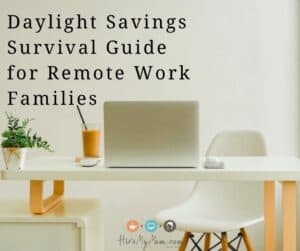Tips for Working from Home with Toddlers

The upside of remote work is that you are able to work at home with your small children… but the downside of remote work is that you are working from home with your kids! Having a flexible schedule is great, but it can be tricky to manage with an active toddler that requires lots of supervision. Our HR and mom experts are here to share some of their favorite tips on how to juggle work and kids:
Utilizing Technology Effectively
According to data from the Pew Research Center, 60% of parents working remotely with young children use digital tools and apps to keep their toddlers occupied. Consider incorporating educational apps and shows into your routine. These tools can provide valuable learning opportunities while giving you a chance to tackle work tasks. However, it’s crucial to set screen time limits to ensure a balance between engagement and learning. Screen time guidelines from pediatric experts can help determine what’s suitable for your child’s age.
Another option is to set up a video call with family or friends. A quick video chat with grandparents or a favorite aunt can be an exciting break for your toddler and give you a few minutes to focus on work. You can also explore virtual storytime sessions or interactive classes designed for young children, which many libraries and educational institutions offer for free.
In addition to apps and video calls, smart home devices can be a practical help. Voice assistants can play children’s songs, read stories, or even answer simple questions, keeping your toddler engaged while you handle work tasks. Ensure you have parental controls in place to maintain a safe digital environment for your child.
Sharing Breaks with Your Toddler
Short breaks with your toddler can be refreshing and valuable. During these breaks, plan activities that foster connection and relaxation. Read a story together or engage in a quick, fun game. Physical activities like a mini dance party or a brief walk can be invigorating for both of you, offering a pleasant change from the workday routine.
Engaging in creative activities can also be rewarding. Simple art projects like drawing or crafting can be enjoyable for your toddler and provide a calming break for you. If you have musical instruments or even simple items like pots and pans, you can create a mini jam session to add some excitement. Incorporate sensory play during these breaks. Activities like playing with kinetic sand, water beads, or even a sensory bin filled with rice can be fascinating for your toddler and provide a different form of engagement. These activities can be both fun and soothing, helping to reset your energy levels.
Don’t forget the importance of fresh air. A quick trip to the backyard or a nearby park allows your toddler to explore and expend some energy, which can be especially beneficial if they’ve been indoors for most of the day. Outdoor playtime can be a great opportunity to connect with nature and enjoy some physical activity together.
Integrating Toddler-Friendly Activities
One effective way to manage remote work while keeping a toddler engaged is to set up a variety of activities that they can enjoy independently. Create a safe and inviting play area with age-appropriate toys, books, and puzzles. Regularly rotating these items can help sustain your toddler’s interest over time. In addition to toys, consider simple craft projects or sensory activities like playdough or water play that require minimal supervision. This setup can give you pockets of uninterrupted time to focus on your work tasks.
Another approach is to involve your toddler in household activities, transforming chores into fun learning experiences. Simple tasks like sorting laundry by color, helping to water plants, or organizing their toys can keep them occupied while providing educational value. Toddlers love to imitate adults, so giving them their “tasks” can be both entertaining and beneficial.
You can also leverage natural breaks in your work schedule to introduce new activities. For instance, when transitioning between tasks, set up a new game or project to keep your toddler engaged. Additionally, consider having a stash of quick and easy activities on hand, like coloring books or building blocks, which can be quickly deployed when you need a few moments of quiet.
Discuss your responsibilities as a parent and the flexibility you might need in your schedule with your employer. Research from the University of California suggests that setting a consistent daily schedule can reduce behavioral issues in toddlers by 30%. Implementing a routine can benefit both you and your toddler, making it easier to anticipate each part of the day. Be realistic about your productivity levels; working with a toddler at home is challenging, and some days may be less productive than others. Accept that there will be interruptions and allow yourself grace as you navigate this balancing act.
Have a tip that you would like to share from your own experience? Reach out! We’d love to hear.





